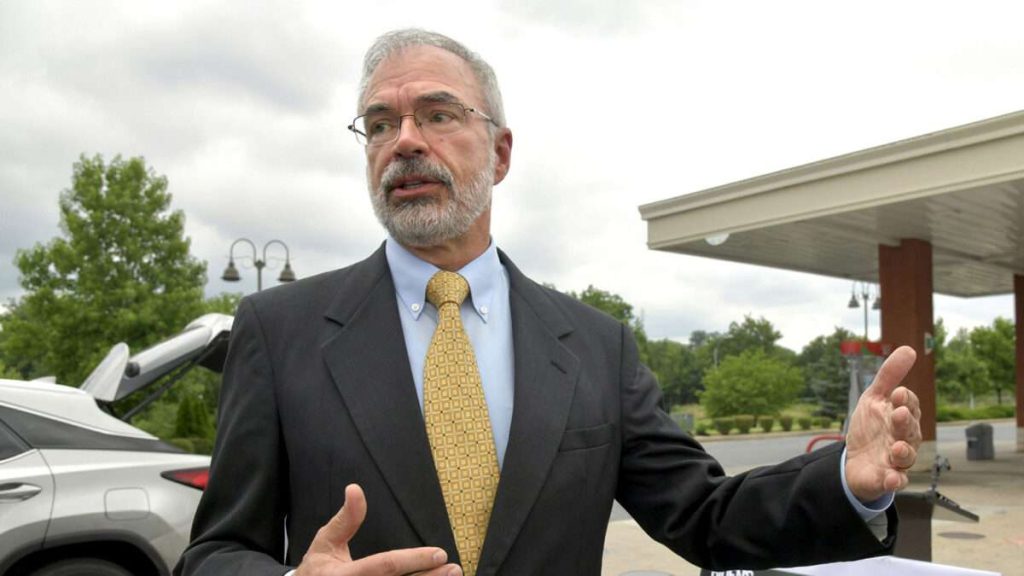With recovery efforts from widespread flooding ongoing across much of western North Carolina in the wake of Hurricane Helene, a Republican congressman has suggested that it “makes a lot of sense” to effectively cancel the presidential election in the state and declare Donald Trump the winner.
It doesn’t, and the state Legislature does not actually have that power.
Politico reports that Rep. Andy Harris (R–Md.) said Thursday that North Carolina state lawmakers should be prepared to override the will of the voters to avoid disenfranchising voters in flood-stricken areas who might have been unable to cast a ballot.
“It looks like just a power play,” Harris said, according to a recording posted to X by Ivan Raiklin, a Trump supporter who has advocated for state lawmakers to seize power over the awarding of electoral votes. “In North Carolina, it’s legitimate. There are a lot of people that aren’t going to get to vote and it may make the difference in that state.”
Elsewhere in the same video, Harris says the move would be legitimate because “you know what that vote probably would have been.”
Uh, no, you don’t. And it looks like a power play because that’s exactly what it would be.
There are any number of reasons why someone might not cast a ballot on Election Day (or via early and absentee voting processes, both of which are ongoing in the parts of North Carolina wrecked by Hurricane Helene). Some people choose not to vote. Others might simply never get around to it. Rainy weather depresses turnout. Rarely, a major natural disaster might strike just before an election.
That doesn’t matter. When someone fails to cast a ballot, they are not granting state lawmakers the power to decide how “that vote probably would have” gone, as Harris is suggesting here. You can’t count votes that don’t exist, period.
This is such a basic principle of (small-d) democratic (small-r) republican political systems that it seems absurd to even have to point it out.
Thankfully, Congress acted in the wake of the 2020 election to block some avenues that state legislatures could use to ignore the legally tallied results. As Richard Pildes, a professor of law at New York University, points out in a post on the Election Law Blog, the Electoral Count Reform Act, passed in 2022, removed a longstanding federal provision that allowed state lawmakers to appoint slates of electors if they determined that a presidential election had “failed.”
“Moreover, even if a natural disaster massively disrupts the election process in a state, federal law now provides that the solution must be a popular vote that takes place once voting is again possible,” Pildes writes. “The federal law leaves it to state law to determine the proper authorities and procedures to use in these circumstances, which state laws on election emergencies (in those states that have such laws) determines.”
So, no, the state Legislature in North Carolina cannot simply hand Trump the state’s 16 electoral votes by saying the storm resulted in a “failed” election—or at least not without challenging that new federal law.
Even so, Harris’ comments suggest that some Republicans are heading into the 2024 election not merely willing to consider antidemocratic maneuvers by state lawmakers, but actively seeking opportunities for such shenanigans.
Back in August, when Vice President Kamala Harris was calling for stricter regulations on the prices charged by grocery stores, Washington Post columnist Catherine Rampell quipped that “when your opponent calls you ‘communist,’ maybe don’t propose price controls.”
A similar thing might now be said about Andy Harris and anyone else in the Republican Party contemplating this type of effort. When your opponents are accusing you of trying to subvert democracy, maybe don’t suggest that it “makes a lot of sense” to ignore the will of the voters.
The post No, Hurricane Helene Does Not Justify Giving North Carolina’s Electoral Votes to Trump appeared first on Reason.com.







